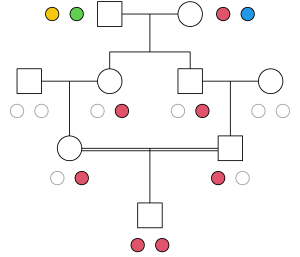Dates: 13-17 June 2022
Location: University of Oslo, Kristine Bonnevies hus (Blindernveien 31).
Organiser: Magnus Dehli Vigeland
Credits: 4 ECTS
Evaluation: The students will do a project after the course, delivering a written report within a month. The report will be marked as passed/not passed.
Course webpage: HERE.
Registration: Closed.
Registration deadline: May 12, 2022.
Lecturers:
Magnus Dehli Vigeland, PhD (UiO)
Course description
The course introduces statistical methods used in relatedness and pedigree analysis, with applications in forensic genetics, medical genetics and pedigree reconstruction.
The study of genetic relatedness and how genetic information flows in families, is central in a variety of important research fields, including medical genetics, forensics and animal breeding. The aim of this course is to introduce the students to the elegant concepts and results forming the theoretical foundation of genetic relatedness, and to present in some detail several modern applications. In the exercises we use R and the ped suite packages for pedigree analysis.
Click here for link to ped suite.
Course program
Monday
09-11 Introduction I: Pedigrees, genetics and probabilities
11-12 Exercises
12-13 Lunch
13-15 Introduction II: Pedigree analysis in R with the ped suite
15-16:30 Exercises
Tuesday
09-11 Relatedness I: What does it mean to be related? IBD and coefficients of relatedness
11-12 Exercises
12-13 Lunch
13-15 Relatedness II: Why are some siblings more equal than others? Distributions of realised relatedness
15-16:30 Exercises
Wednesday
09-11 Forensic applications I
11-12 Exercises
12-13 Lunch
13-15 Inference of relatedness and pedigree reconstruction
15-16:30 Exercises
Thursday
09-11 Forensic applications II
11-12 Exercises
12-13 Lunch
13-15 Segregation analysis in medical genetics
15-16:30 Exercises
Friday
09-11 Genealogical triangulation
11-12 Exercises
12-13 Lunch
13-16:30 Case study and wrap up
Learning outcomes and competence
After completing the course the student will have knowledge about:
- classical concepts and methods of statistical genetics
- important applications of pedigrees and relatedness in forensic and medical genetics
- software for visualising and analysing pedigrees and marker data
Prerequisites
Basic knowledge of genetics and probability. Some experience with R is an advantage but not required.
